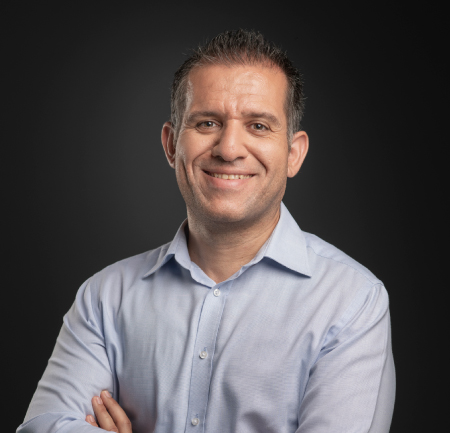
Untangling sustainability

Dr Paris Fokaides, Associate Professor at the Department of Mechanical Engineering, explains how all engineering disciplines are related to sustainable development
What’s the first thing that comes to mind when talking about sustainability? Going green? Protecting the environment? Maybe supporting responsible lifestyle? The existing understanding of sustainability-related terms doesn’t always correspond to the broad notion of what sustainability really is.
Dr Paris A. Fokaides, Associate Professor at Frederick University’s School of Engineering, challenges our existing perceptions and explains how a Mechanical Engineer engages in research and development related to the United Nations’ Sustainable Development Goals (SDGs).
“Indeed, the concept of sustainable development has been associated with the environment and the sciences related to it. In a sense, this approach is correct. However, what the general public may be unaware of is that all engineering disciplines -Mechanical Engineering, Chemical Engineering, Civil Engineering, even Electrical Engineering- are directly related to the environmental performance of a society, and therefore on issues related to sustainability” comments Dr Fokaides.
So why is this happening? As Dr Fokaides explains, “for the very simple reason that any negative impact on the environment, and therefore on sustainability indicators, arises from human activity, which is largely due to the use of machines, mechanical devices or appliances. A car, an airplane, a smokestack, the livestock sector, the emissions of buildings and cities, any process or industrial activity among many other activities, constitute the source of the problem. Therefore, the importance of the involvement of engineers in policies to promote sustainable development is considered fundamental and necessary.”
Dr Fokaides is an expert in the fields of sustainable energy technologies and energy assessment of the built environment, sharing his expertise in Technical Committees of the public sector in Cyprus. In 2012 he founded the Sustainable Energy Research Group (SERG) at Frederick University, which engages with state-of-the-art research regarding sustainable energy resources and building physics, focusing on energy, energy production and management. “It’s important to understand that energy is a natural resource, just as water and air are. Therefore, the sustainable approach of energy lies in its rational use and utilization. To achieve this, we need to make good use of energy but also provide technological solutions able to save energy on the one hand and solutions able to produce energy with alternative renewable resources on the other. That’s where mechanical engineers step in!”.
The energy sector is high on the agenda of the United Nation’s Sustainable Development Goals. By 2030, policies are focused on ensuring universal access to affordable, reliable and modern energy services, increasing the share of renewable energy in the global energy mix, doubling the global rate of improvement in energy efficiency, expanding infrastructure and upgrading technology for supplying modern and sustainable energy services for all. Energy-related issues are further included in several Sustainable Development Goals, either directly or indirectly. “Sustainable development policies are targeted, for example, in the area of the built environment. To a significant extent, this Goal requires activities that relate to energy saving or rational use. Actions aimed at preventing climate change are also directly related to the energy sector, as the climate imbalance is mainly due to greenhouse gas emissions from energy and the uncontrolled use of fossil fuels. Objectives which also concern issues of education, responsible production and consumption but also sustainable agricultural production, are related to the energy sector to a significant degree.”
Frederick University’s Sustainable Energy Research Group (SERG) has an outstanding record of ongoing projects and activities which demonstrate its research work in the fields of experimental building physics and sustainable energy technologies. Through its research, SERG supports the ultimate goal of a sustainable future, while promoting innovative alternative energy production technologies.
Here are some concrete examples of how SERG relates to the SDGs:
- In the building sector, its main focus has been on promoting Industry 4.0 applications in building energy performance assessment practices. These consist of the use of digitized models, the use of telemetry and their processing in real time to draw conclusions about the energy behavior of buildings, the development of digital twins and in general the promotion of smart buildings and cities. “The intelligence of the construction, in our case, lies mainly in the way in which the building itself and its technical provisions perceive and manage the energy needs of the users and the energy consumption” comments Dr Fokaides.
- In the field of alternative energy production technologies, SERG mainly focuses on the field of solar energy but also on waste management for energy production, through the promotion of hybrid, innovative solutions. Waste energy production in particular is a field that combines other scientific areas of sustainability, which are related to issues of circular economy and the efficient use of natural resources.
Is there hope, then, for our little, grand planet? We cannot but be optimistic, says Dr Fokaides. We need to be persistent towards the goal for a sustainable future while our efforts need to be ongoing. “It is self-evident that we are facing a significant transition, especially so in the field of energy. Considering how we produced energy a few years ago, there is a major shift. Solar parks, wind farms, biomass projects recently developed in our country are images of a world that’s changing. Think about the conditions we experienced in buildings of the 90s for example and reflect on the comfort we now feel in newly built constructions. Think about devices for automatic adjustments and operations that are quickly and continuously integrated into our daily lives, automations that make our lives easier and lead to energy consumption reductions at the same time. Due to these developments, we are optimistic about the future. Furthermore, we strongly believe that sooner or later we will be able to create a sustainable environment for the new generations who are much more conscious on environmental issues. After all, it is them who will drive change towards a better future for all.”

